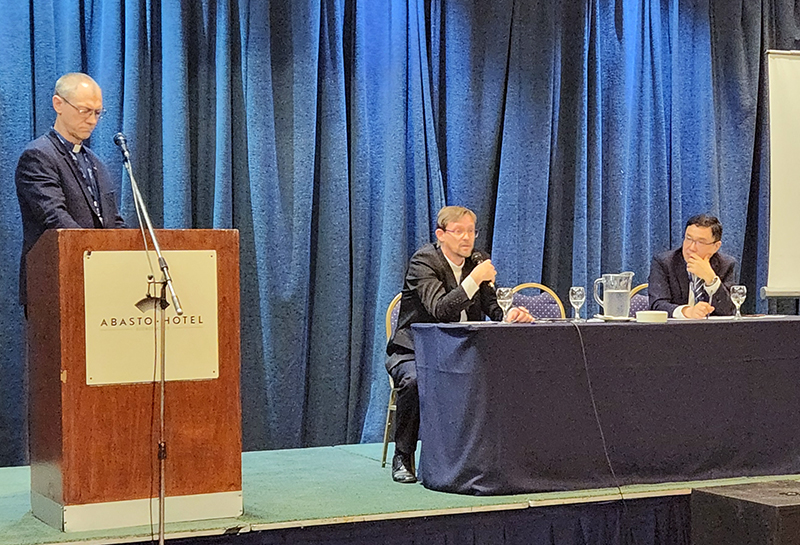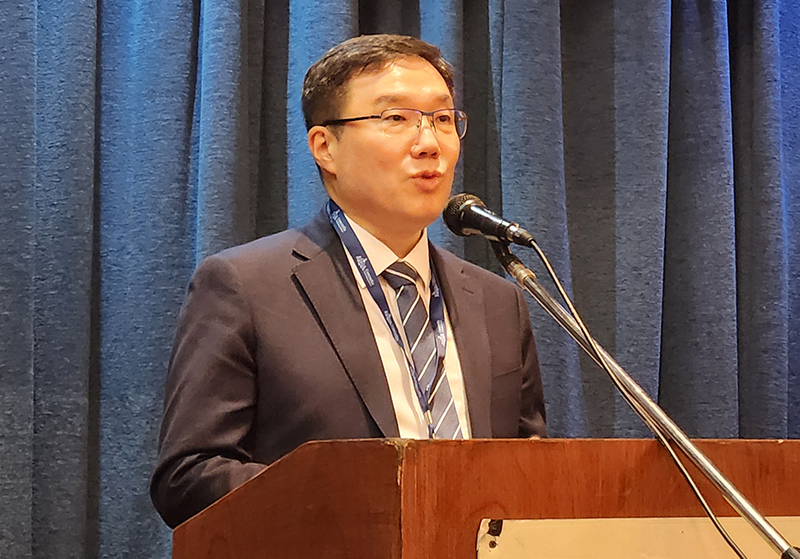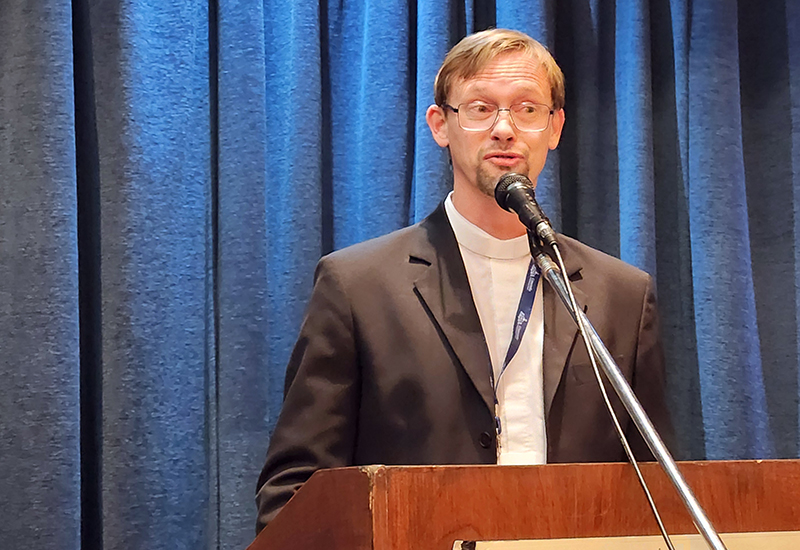
ARGENTINA – The International Lutheran Council’s (ILC) 2024 World Seminaries Conference continued in the afternoon of June 11, with two presentations providing historical perspectives on the relationship between church and state and what it means for theological education.
Rev. Dr. Jun-Hyun Kim spoke first. His presentation, “The Korean Situation and Christian Education,” explored the afternoon’s topic from the perspective of countries—like his own—which have never had a majority Christian population. Dr. Kim is Interim President of Luther Theological University in South Korea, and serves as the Asia Representative on the ILC Seminary Relations Committee.

Dr. Kim discussed the early history of Christianity in Korea, noting how it was Christian churches that brought modern education to the region and highlighting the role Christian schools played in fostering an environment for Korea’s independence movement during Japanese rule. He noted how “Japan’s enforcement of shrine worship was a serious challenge” to Christians, and that many schools chose to close rather than commit idolatry. But “because Christian missionaries played a very important role in Korea’s independence,” he noted, the new authorities after Korean independence permitted the establishment of Christian educational institutions.
In recent years, however, some Korean churches have begun to focus on social issues, and “as a result, churches began to be viewed as political gatherings,” he said. In this new context, governing authorities have begun to view Christian education more as a hindrance than a help, and have enacted new legislation which strips certain freedoms—namely, the ability to choose their own employees—from educational institutions founded by churches.
“It is true that the church must strive for social development,” Dr. Kim said. “However, these are secondary things compared to the primary goal of the church: praising and serving God. Therefore, the church should continue to have a humble and steady attitude and practice of being loyal to the small tasks entrusted to it first rather than leading the development of the world.” If we focus too much on social issues, he cautioned, we risk leaving ourselves exposed to unnecessary temptation and attacks from the outside world.
Rev. Prof. Clécio Schadech spoke next, addressing the theme from the perspective of countries that at one point had a majority Christian population but now no longer do. Prof. Schadech is a professor with Seminario Concordia in Argentina.
Prof. Schadech began his presentation by exploring the fortunes of the early Church in its Eastern context. For some time, he noted Christians lived in significant numbers in places like modern day Iran and Iraq. Even in what was “slowly becoming a Muslim world,” Prof. Schadech noted, “Eastern Christians played a critical role in politics and culture.” But toleration eventually changed to hostility, and the number of Christians in these regions diminished dramatically—from an overwhelming majority in some areas (and a large minority in others) to a tiny minority throughout the East.

Elsewhere in the world, Christians would themselves consolidate political power in response to political upheaval and predatory warlords. “A popular lay movement joined by reform-minded bishops called for a change,” Prof. Schadech explained, ultimately leading to a “renewal of the papacy as the supreme authority” in opposition to predatory earthly rulers. “As a consequence of the strength of the papal authority,” Prof. Schadech said, even the “supreme authority of the emperor over Christendom came to be questioned.” In time, the church would become synonymous with “Christendom” and the state would come to be viewed “as an instrument for the church.”
This was of course challenged in the Reformation, Prof. Schadech continued, with its understanding of the distinct roles of church and state. But in the centuries since, the concept of distinct roles has been supplanted instead by a complete separation between church and state, with spirituality increasingly relegated out of public and into the inner-life of the mind. “We are now living in a ‘post-secular’ context of ‘devaluated values,’ Prof. Schadech argued, “where everyone is invited to voluntarily construct his own spirituality, while in the public arena the ‘norms’ of society must prevail.”
In such a world, Prof. Schadech cautioned, Christians should not think of themselves as God’s “advocate.” Instead, he said, Christians should simply “proclaim God’s Word, faithfully distinguishing Law and Gospel, believing that the Word of God creates what it promises.” The goal of theological education, therefore, must be to “train people to proclaim faithfully the Word for and in the world, without being too much concerned with the temporal structure of the church.”
Due to scheduling conflicts, the conference held Vespers after the plenary discussion which followed Dr. Kim and Prof. Schadech’s presentations. Rev. Dr. Joseph Tom Omolo, Principal of Neema Lutheran College in Kenya and Africa Region representative on the ILC’s Seminary Relations Committee, preached for the service.
The day concluded with a presentation by Rev. Dr. David InyangImuk on “The Challenge of Islam.” Because of problems with his flights, Dr. Imuk—who is Rector of Jonathan Ekong Memorial Lutheran Seminary in Nigeria—was unable to be present at the conference in person and spoke instead via livestream. The plenary discussion that followed explored the importance of understanding Islam better but also the challenges that it poses for Christians today.
———————
Find more news on the ILC’s 2024 World Seminaries Conference here.
